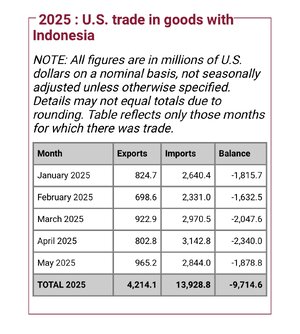- Messages
- 8,287
All these fucking boot lickers. I can't recall so many people kissing a President's ass like this before. It's sickening to see.
Follow along with the video below to see how to install our site as a web app on your home screen.
Note: This feature may not be available in some browsers.
All these fucking boot lickers. I can't recall so many people kissing a President's ass like this before. It's sickening to see.
As I understand it, the proposal is for secondary tariffs, meaning that we would asses punitive tariffs on any country that trades with Russia, like China and India.What a loser
Russia sells Oil-I mean thats what they sell
And they don't need our market
ThanksAs I understand it, the proposal is for secondary tariffs, meaning that we would asses punitive tariffs on any country that trades with Russia, like China and India.
Yeah, Trump was pretty vague about it. No one seems to know if that is a tariff only on “transshipped” goods (say India buys a widget directly from Russia and then sells the widget to America as a middleman) or on all goods of a country that buys oil from Russia. The difference is substantial. And the 50 days aligns very closely with a planned 60 day assault that Putin reportedly described to Trump on a recent call as necessary to complete ahead of any peace talks.As I understand it, the proposal is for secondary tariffs, meaning that we would asses punitive tariffs on any country that trades with Russia, like China and India.
Trump, vague? No way...Yeah, Trump was pretty vague about it. No one seems to know if that is a tariff only on “transshipped” goods (say India buys a widget directly from Russia and then sells the widget to America as a middleman) or on all goods of a country that buys oil from Russia. The difference is substantial. And the 50 days aligns very closely with a planned 60 day assault that Putin reportedly described to Trump on a recent call as necessary to complete ahead of any peace talks.
So it seems Trump is tacitly supporting Russia’s 60-day assault plan but willing to provide defensive weapons (with little use against drones but should help against missiles). Basically going along with Putin’s aim to expand Russian gains along the Ukraine border ahead of a possible ceasefire in September. Note that October and November in Ukraine are a muddy season that slows/limits military advancement action anyway, so it is not clear how much Trump is shifting his policy so much as shifting his rhetoric.
But we’ll see. One thing this accomplished was stalling a bipartisan sanctions bill that was going to pass the Senate.
——
Thune hits brakes on Russia sanctions package
The Senate bill is now in limbo after President Donald Trump pledged to take action Monday.


I have never heard of secondary tariffs and the concept doesn't make any sense. Countries don't trade with other countries; businesses do.As I understand it, the proposal is for secondary tariffs, meaning that we would asses punitive tariffs on any country that trades with Russia, like China and India.
Biden floated the idea and backed off. Of course, none of anything Trump does makes sense, but that is the way it was explained on CNBC yesterday morning.I have never heard of secondary tariffs and the concept doesn't make any sense. Countries don't trade with other countries; businesses do.
Trump reminds me of Foster Brooks. Well... you could laugh at Foster because you knew he was mumbling shit intentionally. But Trump, he has been known to contradict himself in the same sentence. Thank God, he doesn't drink.Trump, vague? No way...
That's what secondary tariffs would mean if they existed. But as far as I can tell, a secondary tariff has never been implemented -- surely in part because it makes no sense at all.Biden floated the idea and backed off. Of course, none of anything Trump does makes sense, but that is the way it was explained on CNBC yesterday morning.
Maybe trump could just start a world sales tax with all of the revenues going to the trump foundation, via the United States.That's what secondary tariffs would mean if they existed. But as far as I can tell, a secondary tariff has never been implemented -- surely in part because it makes no sense at all.
Suppose an Indian company starts buying Russian parts. We're going to slap tariffs on all of India because of that firm? How many firms have to be importing for the secondary tariffs to take effect? Does the government have to know? Does the government have to care? How would we enforce this?
Secondary sanctions punish firms, which can work because it's firms who do business with (or refrain from doing so) Russia. It's a firm-level carrot/stick for firm-level behavior. Secondary tariffs are just stupid. They are so stupid that I keep typing "secondary sanctions" because my fingers apparently think secondary tariffs are too ridiculous even to type.
ChatGPT tells me that Biden never talked about secondary tariffs, which makes sense because he had competent economic advisors.

